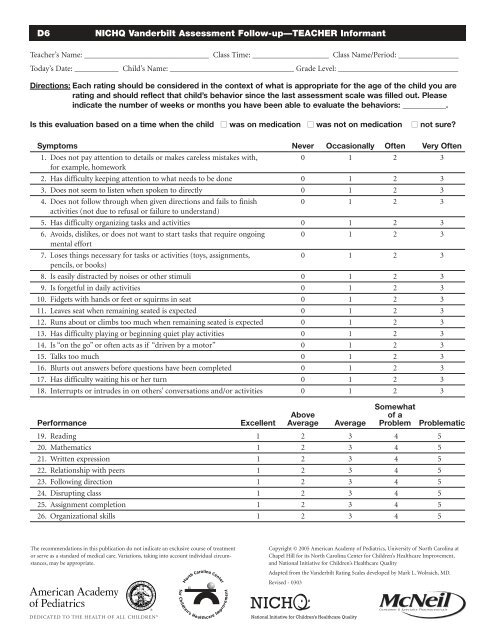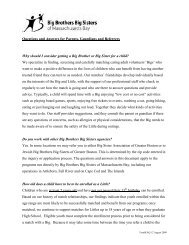NICHQ Vanderbilt Assessment Follow-upâTEACHER Informant
NICHQ Vanderbilt Assessment Follow-upâTEACHER Informant
NICHQ Vanderbilt Assessment Follow-upâTEACHER Informant
You also want an ePaper? Increase the reach of your titles
YUMPU automatically turns print PDFs into web optimized ePapers that Google loves.
D6<br />
<strong>NICHQ</strong> <strong>Vanderbilt</strong> <strong>Assessment</strong> <strong>Follow</strong>-up—TEACHER <strong>Informant</strong><br />
Teacher’s Name: _______________________________ Class Time: ___________________ Class Name/Period: _______________<br />
Today’s Date: ___________ Child’s Name: _______________________________ Grade Level: ______________________________<br />
Directions: Each rating should be considered in the context of what is appropriate for the age of the child you are<br />
rating and should reflect that child’s behavior since the last assessment scale was filled out. Please<br />
indicate the number of weeks or months you have been able to evaluate the behaviors: ___________.<br />
Is this evaluation based on a time when the child ■ was on medication ■ was not on medication ■ not sure?<br />
Symptoms Never Occasionally Often Very Often<br />
1. Does not pay attention to details or makes careless mistakes with, 0 1 2 3<br />
for example, homework<br />
2. Has difficulty keeping attention to what needs to be done 0 1 2 3<br />
3. Does not seem to listen when spoken to directly 0 1 2 3<br />
4. Does not follow through when given directions and fails to finish 0 1 2 3<br />
activities (not due to refusal or failure to understand)<br />
5. Has difficulty organizing tasks and activities 0 1 2 3<br />
6. Avoids, dislikes, or does not want to start tasks that require ongoing 0 1 2 3<br />
mental effort<br />
7. Loses things necessary for tasks or activities (toys, assignments, 0 1 2 3<br />
pencils, or books)<br />
8. Is easily distracted by noises or other stimuli 0 1 2 3<br />
9. Is forgetful in daily activities 0 1 2 3<br />
10. Fidgets with hands or feet or squirms in seat 0 1 2 3<br />
11. Leaves seat when remaining seated is expected 0 1 2 3<br />
12. Runs about or climbs too much when remaining seated is expected 0 1 2 3<br />
13. Has difficulty playing or beginning quiet play activities 0 1 2 3<br />
14. Is “on the go” or often acts as if “driven by a motor” 0 1 2 3<br />
15. Talks too much 0 1 2 3<br />
16. Blurts out answers before questions have been completed 0 1 2 3<br />
17. Has difficulty waiting his or her turn 0 1 2 3<br />
18. Interrupts or intrudes in on others’ conversations and/or activities 0 1 2 3<br />
Somewhat<br />
Above<br />
of a<br />
Performance Excellent Average Average Problem Problematic<br />
19. Reading 1 2 3 4 5<br />
20. Mathematics 1 2 3 4 5<br />
21. Written expression 1 2 3 4 5<br />
22. Relationship with peers 1 2 3 4 5<br />
23. <strong>Follow</strong>ing direction 1 2 3 4 5<br />
24. Disrupting class 1 2 3 4 5<br />
25. Assignment completion 1 2 3 4 5<br />
26. Organizational skills 1 2 3 4 5<br />
The recommendations in this publication do not indicate an exclusive course of treatment<br />
or serve as a standard of medical care. Variations, taking into account individual circumstances,<br />
may be appropriate.<br />
Copyright © 2005 American Academy of Pediatrics, University of North Carolina at<br />
Chapel Hill for its North Carolina Center for Children’s Healthcare Improvement,<br />
and National Initiative for Children’s Healthcare Quality<br />
Adapted from the <strong>Vanderbilt</strong> Rating Scales developed by Mark L. Wolraich, MD.<br />
Revised - 0303
D6<br />
<strong>NICHQ</strong> <strong>Vanderbilt</strong> <strong>Assessment</strong> <strong>Follow</strong>-up—TEACHER <strong>Informant</strong>, continued<br />
Teacher’s Name: _______________________________ Class Time: ___________________ Class Name/Period: ________________<br />
Today’s Date: ___________ Child’s Name: _______________________________ Grade Level: ______________________________<br />
Side Effects: Has the child experienced any of the following side Are these side effects currently a problem?<br />
effects or problems in the past week? None Mild Moderate Severe<br />
Headache<br />
Stomachache<br />
Change of appetite—explain below<br />
Trouble sleeping<br />
Irritability in the late morning, late afternoon, or evening—explain below<br />
Socially withdrawn—decreased interaction with others<br />
Extreme sadness or unusual crying<br />
Dull, tired, listless behavior<br />
Tremors/feeling shaky<br />
Repetitive movements, tics, jerking, twitching, eye blinking—explain below<br />
Picking at skin or fingers, nail biting, lip or cheek chewing—explain below<br />
Sees or hears things that aren’t there<br />
Explain/Comments:<br />
For Office Use Only<br />
Total Symptom Score for questions 1–18: ____________________________________<br />
Average Performance Score: ______________________________________________<br />
Please return this form to: ________________________________________________________________________________________________________<br />
Mailing address:__________________________________________________________________________________________________________________<br />
__________________________________________________________________________________________________________<br />
Fax number: __________________________________________________________________________________________________________________________________________________________<br />
Adapted from the Pittsburgh side effects scale, developed by William E. Pelham, Jr, PhD. Available for downloading at no cost in expanded format at http://wings.buffalo.edu/adhd







